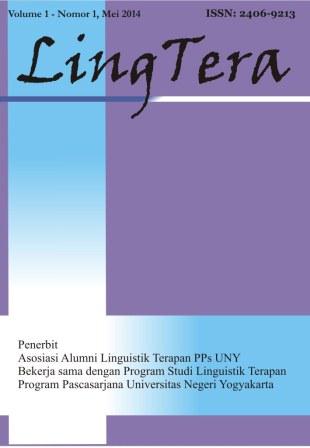Implementation of peer-assessment system in speaking courses
DOI:
https://doi.org/10.21831/lt.v11i2.76154Keywords:
academic context, informative, peer-assessment, persuasive, speakingAbstract
References
Abbaspour, F. (2016). Speaking Competence and Its Components: A Review of Literature. International Journal of research in Linguistic, Language Teaching and Testing, vol.1, no. 4, pp. 144-152. https://doi.org/10.1016/j.stueduc.2019.100821.
Adachi, C., Tai, J., Dawson, P. (2018). Academics' perceptions of the benefits and challenges of self and peer assessment in higher education," Assessment and Evaluation in Higher Education, vol. 43, no. 2, pp. 294–306. https://doi.org/10.1080/02602938.2017.1339775.
Ashraf, H., & Mahdinezhad, M. (2015).The role of peer-assessment versus self- assessment in promoting autonomy in language use: A case of EFL learners. Iranian Journal of Language Testing, vol. 5, no. 2, pp. 110–120.
Black, P., Harrison, C., Lee, C., Marshall, B., Wiliam, D. (2003). Assessment for learning: putting it into practice. Buckingham: Open University Press.
Brown, D. (2004). Language Assessment: Principles and Classroom Practices. New York: Addison Wesly Longman Inc.
Brown, D. (2007). Principles of Language Learning and Teaching. San Fransisco: Pearson Education, Inc.
David, P., & Pearse, E. (2000). Success in English Teaching. New York: Oxford University Press.
Davidson, P., & Lloyd, D. (2015). Guidelines for developing a reading test, In Lloyd, D., Davidson, P. & Coombe, C. (Eds.), The fundamentals of language assessment: A practical guide for teachers in the Gulf. Dubai, UAE: TESOL Arabia Publications.
De Grez, L., Roozen, I., Valcke, M. (2012). How effective are self- and peer assessment of oral presentation skills compared with Teachers' assessments? Active Learning in Higher Education, vol. 13, no. 2, pp. 129–142.
Eliyasun, E., & Salam, U. (2018). Improving Students' Speaking Ability Through Guided Questions. Journal Pendidikan dan Pembelajaran, vol. 7, no. 1, pp. 1-8.
Falchikov, N., Goldfinch, J. (2000). Student peer assessment in Higher Education: A metaanalysis comparing peer and teacher marks. Review of Educational Research, vol. 70, no. 3, pp. 287–322.
Flowerdew, J. (2002). Genre in classroom: A linguistic approach, in A. M. Johns (ed.), Genre in classroom: Multiple perspective. Routledge.
Ganna, M., Haryanto, H., Salija, K. (2018). Teachers' Strategies in Teaching Speaking (A Case Study of An English Teacher In SMA Negeri 1 Toraja Utara).
Haryudin, A., & Jamilah S. (2018). Teacher's Difficulties in Teaching Speaking Using Audio Visual AID for Autistic Students. ELTIN Journal, vol. 6, no. 2, pp. 59-68.
Hargreaves, A., Earl, L., Schmidt, M. (2002). Perspectives on alternative assessment reform. American Educational Research Journal, vol. 39, no. 1, pp. 69–95.
Joordens, S., Pare, D., Pruesse, K. (2009). PeerScholar: An evidence-based online peer assessment tool supporting critical thinking and clear communication. Proceedings of the 2009 International Conference on E- Learning, pp. 236–240.
Kumaravadivelu, B. (2003). Beyond method: Macrostrategies for Language Teaching. New York: Yale University Press.
Leahy, S., Lyon, C., Thompson, M., Wiliam, D. (2005). Classroom assessment: Minute by minute, day by day. Educational Leadership vol. 63, no. 3, pp. 18–26.
Leong, L., & Ahmadi, S. (2017). An Analysis of Factor Influnecing Learners' Speaking Skill. International Journal of Research in English Education, vol. 3, no. 1, pp. 34-41.
Liu, F., & Carless, D. (2006). Peer feedback: The learning element of peer assessment. Teaching in Higher Education, 11(3), 279–290.
Luoma, S. (2009). Assessing Speaking. Cambridge: Cambridge University Press.
Martinez, F., & Uso-Juan, E. (2006). Current Trends in the Development and Teaching of the Four Language Skills (Studies on Language Acquisition). Walter de Gruyter Gmbtl. & Co.
Nurayani, E., Sulistyarini, W., Tukimun, T. (2021). Teaching speaking strategies. Amerta Media.
Panadero, E. (2016). Is it safe? Social, interpersonal, and human effects of peer assessment: A review and future directions, in G. T. L. Brown, & L. R. Harris (Eds.). Handbook of human and social conditions in assessment (pp. 247– 266). New York, NY: Routledge.
Pope, N. (2001). An examination of the use of peer rating for formative assessment in the context of the theory of consumption values. Assessment and Evaluation in Higher Education, vol. 26, no. 3, pp. 235–246.
Puspasari, A., & Hudayani, N. (2018). Increasing autonomous learning through peer assessment technique. Annual International Conference on Language and Literature, vol. 1, pp. 104-117.
Shen, B., Bai, B., Xue, W. (2020). The effects of peer assessment on learner autonomy: An empirical study in a Chinese college English writing class. Studies in Educational Evaluation, pp. 1-10.
Topping, J. (2010). Peers as a source of formative assessment, in H. L. Andrade & G. J. Cizek (Eds.), Handbook of formative assessment. New York: Routledge.
Topping, J. (2018). Using Peer Assessment to Inspire Reflection and Learning. New York: Routledge.
William, M., & Burden, L. (2003). Psychology for language teachers: A social constructivist approach. Cambridge: Cambridge University Press.
Zuhriyah, M. (2017). Storytelling to Improve Students' Speaking Skill. English Education: Jurnal Tadris Bahasa Inggris, vol. 10, no. 1, pp. 119- 134.
Downloads
Published
How to Cite
Issue
Section
Citation Check
License
LingTera allows readers to read, download, copy, distribute, print, search, or link to its articles' full texts and allows readers to use them for any other lawful purpose. The journal allows the author(s) to hold the copyright without restrictions. Finally, the journal allows the author(s) to retain publishing rights without restrictions.
- Authors are allowed to archive their submitted articles in an open-access repository.
- Authors are allowed to archive the final published article in an open-access repository with an acknowledgment of its initial publication in this journal.

Psychology, Evaluation, and Technology in Educational Research is licensed under a Creative Commons Attribution-ShareAlike 4.0 International License.
Based on a work at https://petier.org/index.php/PETIER.









